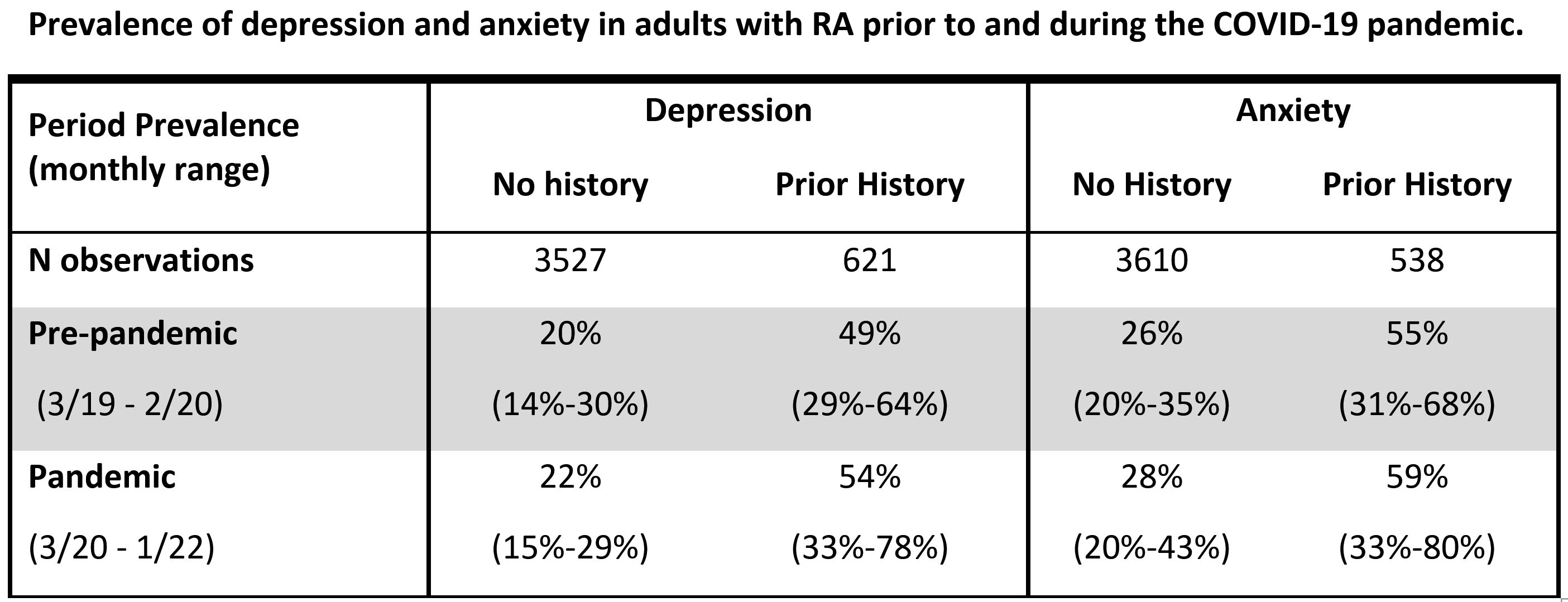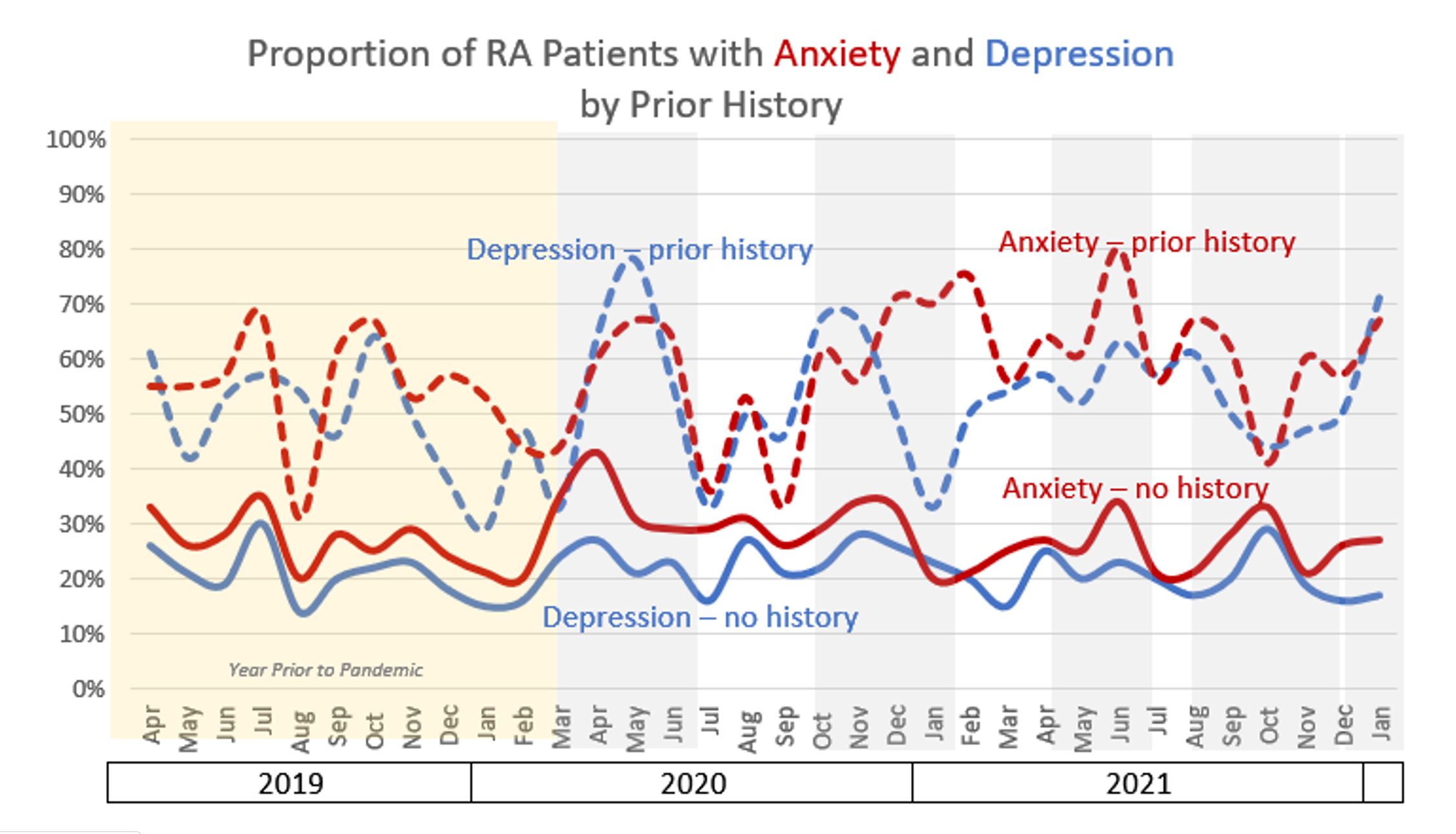Back
Poster Session D
Epidemiology, health policy and outcomes
Session: (1750–1786) Epidemiology and Public Health Poster III
1778: More Than Half of RA Patients with a Lifetime History of Mood Disorders or Anxious and Depressed During COVID-19 Pandemic
Monday, November 14, 2022
1:00 PM – 3:00 PM Eastern Time
Location: Virtual Poster Hall
- SB
Susan Bartlett, PhD
Professor of Medicine
McGill University
Montreal, QC, Canada
Abstract Poster Presenter(s)
Susan Bartlett1, orit schieir2, Marie-France Valois2, Diane Tin3, Glen Hazlewood4, Louis Bessette5, Gilles Boire6, Carol Hitchon7, Janet Pope8, Carter Thorne9 and Vivian Bykerk10, 1McGill University, Montreal, QC, Canada, 2McGill University, Montréal, QC, Canada, 3The Arthritis Program Research Group, Newmarket, ON, Canada, 4University of Calgary, Calgary, AB, Canada, 5Centre de l'Ostoporose et de Rhumatologie de Québec, Québec, QC, Canada, 6Universite de Sherbrooke, Sherbrooke, QC, Canada, 7University of Manitoba, Winnipeg, MB, Canada, 8University of Western Ontario, London, ON, Canada, 9Southlake Regional Health Centre, Newmarket, ON, Canada, 10Hospital for Special Surgery, New York, NY
Background/Purpose: Chronic stress and chronic disease are risk factors for anxiety and depression. In Canadians with RA, pandemic-related stress was exacerbated by delayed access to vaccines, periodic lockdowns, and initial uncertainty about medication access. We compared trends in the prevalence of anxiety and depression prior to and during the first 22 months of the pandemic in RA patients with and without a lifetime history of mood disorders.
Methods: The analytic sample included adults with RA enrolled in the Canadian Early Arthritis Cohort (CATCH). CATCH is a prospective multi-center study of early RA (symptoms < 1 year; 81% meet 2010 ACR/EULAR criteria at enrolment) who receive care from rheumatologists across Canada. Prior to the pandemic, participants completed PROs and rheumatologists conducted assessments during scheduled in-person visits. After March 2020, ongoing collection of PROs continued at in-person and remote visits.
We estimated monthly trends in prevalence of clinically significant levels of anxiety and depression (PROMIS Depression and Anxiety 4a score ≥55) from all visits between Mar 2019-Jan 2022 and compared rates for the year prior to (Mar 3/19-2/20) and first 23 months of the pandemic (3/20-1/22) stratified by lifetime history of mood disorders.
Results: 4148 visits were completed from 2/19 to 1/22 in 1,644 RA patients with a mean (SD) age of 60 (14) and disease duration of 6 (4) years; 73% were women, 84% white, 60% had completed some post-secondary education, and 77% were in CDAI REM/LDA at the visit closest to the start of pandemic. 253 (15%) reported a lifetime history of depression and 217 (13%) of anxiety; 8% reported prior treatment for either.
Patients with a history of mood disorders had higher levels of depression and anxiety prior-to and during the pandemic compared with patients without a history of mood disorders (Table). During the first 22 months of the COVID-19 pandemic, the proportion of patients with depression and anxiety increased in all groups. More than half of those with a history of emotional distress had clinically significant levels of depression and anxiety; proportions were highest during COVID waves in all and were substantially higher in patients with a previous history of either as compared to those without a history (see figure). Whereas depressive symptoms peaked early in the pandemic, anxiety generally increased with each wave, peaking in Wave 3 (May-Jun 2021).
Conclusion: Symptoms of anxiety and depression were common in Canadian adults with RA prior to and after the onset of the COVID-19 pandemic. While increased proportions of adults reporting depression and anxiety occurred early in the pandemic but declined fairly rapidly in general populations, emotional distress was not attenuated over time in this large cohort of RA patients. Individuals reporting lifetime history of mood disorders were more than twice as likely to report anxiety and depression, with depression peaking early in the pandemic and anxiety growing with each successive waves. The results demonstrate the importance of applying a lifetime perspective as previous episodes of anxiety and depression may be an important marker of increased vulnerability and recurrence in RA patients, particularly during the pandemic.


Disclosures: S. Bartlett, Pfizer, Novartis, Merck/MSD, Janssen, AbbVie/Abbott, Organon; o. schieir, None; M. Valois, None; D. Tin, None; G. Hazlewood, None; L. Bessette, AbbVie/Abbott, Amgen, Bristol-Myers Squibb(BMS), Celgene, Eli Lilly, Janssen, Novartis, Pfizer, Sanofi-Genzyme, UCB, Gilead, Merck/MSD, Organon, Roche; G. Boire, AbbVie/Abbott, Bristol-Myers Squibb(BMS), Janssen, Eli Lilly, Merck/MSD, Novartis, Orimed Pharma, Pfizer, Samsung Bioepis, Teva, Viatris, Amgen, Celgene; C. Hitchon, Pfizer Canada, Astra-Zeneca Canada, Pfizer; J. Pope, AbbVie/Abbott, Bristol-Myers Squibb(BMS), Eli Lilly, merk, Roche, Seattle Genetics, UCB, Actelion, Amgen, Bayer, Eicos Sciences, Emerald, Gilead, Janssen, Novartis, Pfizer, Sandoz, Sanofi, Boehringer Ingelheim; C. Thorne, AbbVie/Abbott, Amgen, Celgene, CaREBiodam, Centocor, Janssen, Eli Lilly, Novartis, Pfizer, Sanofi, Medexus/Medac, Merck; V. Bykerk, Amgen, Bristol-Myers Squibb(BMS), Genzyme, Brainstorm, Gilead, Regeneron, UCB, Pfizer, Sanofi, Aventis.
Background/Purpose: Chronic stress and chronic disease are risk factors for anxiety and depression. In Canadians with RA, pandemic-related stress was exacerbated by delayed access to vaccines, periodic lockdowns, and initial uncertainty about medication access. We compared trends in the prevalence of anxiety and depression prior to and during the first 22 months of the pandemic in RA patients with and without a lifetime history of mood disorders.
Methods: The analytic sample included adults with RA enrolled in the Canadian Early Arthritis Cohort (CATCH). CATCH is a prospective multi-center study of early RA (symptoms < 1 year; 81% meet 2010 ACR/EULAR criteria at enrolment) who receive care from rheumatologists across Canada. Prior to the pandemic, participants completed PROs and rheumatologists conducted assessments during scheduled in-person visits. After March 2020, ongoing collection of PROs continued at in-person and remote visits.
We estimated monthly trends in prevalence of clinically significant levels of anxiety and depression (PROMIS Depression and Anxiety 4a score ≥55) from all visits between Mar 2019-Jan 2022 and compared rates for the year prior to (Mar 3/19-2/20) and first 23 months of the pandemic (3/20-1/22) stratified by lifetime history of mood disorders.
Results: 4148 visits were completed from 2/19 to 1/22 in 1,644 RA patients with a mean (SD) age of 60 (14) and disease duration of 6 (4) years; 73% were women, 84% white, 60% had completed some post-secondary education, and 77% were in CDAI REM/LDA at the visit closest to the start of pandemic. 253 (15%) reported a lifetime history of depression and 217 (13%) of anxiety; 8% reported prior treatment for either.
Patients with a history of mood disorders had higher levels of depression and anxiety prior-to and during the pandemic compared with patients without a history of mood disorders (Table). During the first 22 months of the COVID-19 pandemic, the proportion of patients with depression and anxiety increased in all groups. More than half of those with a history of emotional distress had clinically significant levels of depression and anxiety; proportions were highest during COVID waves in all and were substantially higher in patients with a previous history of either as compared to those without a history (see figure). Whereas depressive symptoms peaked early in the pandemic, anxiety generally increased with each wave, peaking in Wave 3 (May-Jun 2021).
Conclusion: Symptoms of anxiety and depression were common in Canadian adults with RA prior to and after the onset of the COVID-19 pandemic. While increased proportions of adults reporting depression and anxiety occurred early in the pandemic but declined fairly rapidly in general populations, emotional distress was not attenuated over time in this large cohort of RA patients. Individuals reporting lifetime history of mood disorders were more than twice as likely to report anxiety and depression, with depression peaking early in the pandemic and anxiety growing with each successive waves. The results demonstrate the importance of applying a lifetime perspective as previous episodes of anxiety and depression may be an important marker of increased vulnerability and recurrence in RA patients, particularly during the pandemic.


Disclosures: S. Bartlett, Pfizer, Novartis, Merck/MSD, Janssen, AbbVie/Abbott, Organon; o. schieir, None; M. Valois, None; D. Tin, None; G. Hazlewood, None; L. Bessette, AbbVie/Abbott, Amgen, Bristol-Myers Squibb(BMS), Celgene, Eli Lilly, Janssen, Novartis, Pfizer, Sanofi-Genzyme, UCB, Gilead, Merck/MSD, Organon, Roche; G. Boire, AbbVie/Abbott, Bristol-Myers Squibb(BMS), Janssen, Eli Lilly, Merck/MSD, Novartis, Orimed Pharma, Pfizer, Samsung Bioepis, Teva, Viatris, Amgen, Celgene; C. Hitchon, Pfizer Canada, Astra-Zeneca Canada, Pfizer; J. Pope, AbbVie/Abbott, Bristol-Myers Squibb(BMS), Eli Lilly, merk, Roche, Seattle Genetics, UCB, Actelion, Amgen, Bayer, Eicos Sciences, Emerald, Gilead, Janssen, Novartis, Pfizer, Sandoz, Sanofi, Boehringer Ingelheim; C. Thorne, AbbVie/Abbott, Amgen, Celgene, CaREBiodam, Centocor, Janssen, Eli Lilly, Novartis, Pfizer, Sanofi, Medexus/Medac, Merck; V. Bykerk, Amgen, Bristol-Myers Squibb(BMS), Genzyme, Brainstorm, Gilead, Regeneron, UCB, Pfizer, Sanofi, Aventis.

